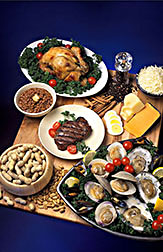This page has been archived and is being provided for reference purposes only. The page is no longer being updated, and therefore, links on the page may be invalid.
Read the magazine story to find out more. |
|
Panting Through Your Workouts? Try Getting Enough Zinc
By Rosalie Marion BlissApril 3, 2006
Consuming lower than recommended levels of dietary zinc could be especially hard on the body during exercise, according to an Agricultural Research Service (ARS) study. That’s because tiny amounts of the mineral are contained in hundreds of zinc-dependent enzymes that play a role in regulating energy expenditure.
One such friendly, zinc-dependent enzyme—carbonic anhydrase—helps the body clear away byproducts of daily cellular activity. The enzyme actually escorts carbon dioxide out of the body—from body tissue to blood, from blood to air sacs in the lungs, and from the lungs out into the air.
The findings were reported by ARS physiologist Henry C. Lukaski in the American Journal of Clinical Nutrition. Lukaski is assistant director of the ARS Grand Forks (N.D.) Human Nutrition Research Center. ARS is the U.S. Department of Agriculture's chief scientific research agency.
During the study, a group of active young men in their 20s and early 30s experienced a significant drop in physiological efficiency while exercising, when their zinc intake had been reduced to about one-third of their Recommended Dietary Allowance (RDA) for nine weeks. They were fed a low-zinc diet of slightly more than 3.5 milligrams (mg) daily, compared to the RDA of 11 mg daily.
For contrast, when the same group exercised the same way for nine weeks while consuming the same foods, but supplemented with 15 mg of zinc daily, their physiological response was normal during exercise.
When zinc intake is too low, carbon dioxide backs up all the way to muscle cells, according to Lukaski. That results in acid-laden cells that require more oxygen for clearing toxic byproducts.
Read more about this research in the April 2006 issue of Agricultural Research magazine.

